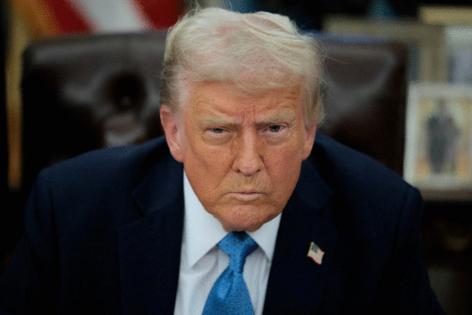Trump-Xi truce under fire as US targets Chinese students, tech
Published in News & Features
Just weeks after U.S. President Donald Trump declared a “total reset” with China following a trade truce in Geneva, tensions are rising again between the world’s biggest economies.
Trump’s administration Wednesday announced it would start revoking Chinese student visas, while also introducing new restrictions on the sales of chip design software and reportedly some jet engine parts to China. That came shortly after it sought to block Huawei Technologies Co. from selling advanced AI chips anywhere in the world, prompting an angry rebuke from Beijing.
“Geneva was positive because both sides are officially talking to each other,” said Alfredo Montufar-Helu, senior adviser to the China Center at the Conference Board. “But the negotiations didn’t really deal with the core issues that are driving competition between the two sides. Chief of them all — technological dominance.”
While U.S. and Chinese negotiators brought down tariffs from eye-watering levels for 90-days, they still need to hammer out a deal to rebalance trade — that took years in Trump’s first term. Both sides are also in disagreement over Beijing’s role in the illegal fentanyl trade, as well as rare earths and chip controls.
In a sign any larger deal is a way off, Trump has yet to speak with his Chinese counterpart since returning to office, despite suggesting several times such a call was imminent.
The crackdown on Chinese students — the second largest international group in the U.S. — was unveiled by Secretary of State Marco Rubio, who before taking office was twice sanctioned by Beijing. That dispelled any notion China hawks within the Trump administration are losing influence, after trade officials in Switzerland showed a preference for dealmaking with Beijing.
China’s Foreign Ministry called the visa policy “discriminatory” at a regular briefing in Beijing on Thursday, with spokeswomen Mao Ning saying it would “only further undermine” America’s global reputation. That relatively restrained response, along with the fact officials didn’t signal any retaliation, suggests Beijing is trying to avoid sending ties into another tailspin.
Still, the decision to put Chinese students under fresh scrutiny highlights the deep suspicion underpinning bilateral ties, with Republicans and Democrats alike now viewing China as a major threat to American security. For its part, Beijing has launched an anti-spying campaign that casts a wide net of suspicion on foreigners, particularly from the U.S.
John Moolenaar, chairman of the House Select Committee on the Chinese Communist Party, denied the U.S. actions were designed to target ordinary people in the Asian country. “It’s the aggression of the Chinese Communist Party that we’re pushing back on,” he told Bloomberg Television.
Moolenaar represents U.S. lawmakers who are skeptical of China’s influence in the U.S., including on campuses across the country. He accused Beijing of making Chinese students do its bidding and earlier this month co-signed a letter to Harvard University demanding information on its China links.
“The end goal is to have a relationship with China that acknowledges the reality that their government is moving in a very different direction than they promised,” he added.
Moolenaar got what he wanted when Trump moved to block Harvard from enrolling international students over claims the school’s leadership had coordinated with the Communist Party. U.S. lawmakers allege the university trained members of a company sanctioned for alleged human-rights abuses.
“This will only stoke misunderstanding, mistrust and even hatred between two societies,” said Wu Xinbo, director at Fudan University’s Center for American Studies in Shanghai. “I’m afraid the Trump administration will come up with more crazy ideas and actions hurting China-U.S. relations.”
Trump’s approach contrasts sharply with Xi, who has touted people-to-people exchanges as the foundation of healthy U.S. ties. The Chinese leader in 2023 pledged to bring 50,000 young Americans to China over five years to stabilize relations. Some 16,000 American youths participated last year, according to Jing Quan, a minister at the Chinese embassy in the U.S.
While it’s unclear how the latest policy will be enforced, expelling Chinese students from the U.S. threatens to reignite a flashpoint in ties from Trump’s first term. Back then, the US revoked over 1,000 visas of Chinese pupils and scholars, alleging they were stealing U.S. technology and intellectual property for China’s military.
In China, the hardening U.S. stance was met with disbelief and resentment on social media. “I can’t believe Trump has shown us in our life time how quickly the U.S. empire is declining,” one user wrote on China’s X-like Weibo platform.
Creating a hostile environment for overseas students could push talent back toward China. That aligns with Beijing’s ambition to bolster domestic innovation, as Xi turns high-tech manufacturing into a key growth driver for the economy.
Chinese students have made critical contributions to America’s technological success and scientific leadership, said Jessica Chen Weiss, the David M. Lampton professor of China studies at Johns Hopkins University’s School of Advanced International Studies in Washington.
During the McCarthy era of intense U.S. suspicion, leading rocket scientist Qian Xuesen was prevented from continuing his scientific career in the country, despite having co-founded NASA’s jet propulsion laboratory at Caltech.
That was to Beijing’s benefit, Chen Weiss said: “He returned to China, where he helped develop China’s ballistic missile program.”
_____
(With assistance from Haslinda Amin, Qianwei Zhang, Allen Wan, Minmin Low and Lucille Liu.)
_____
©2025 Bloomberg L.P. Visit bloomberg.com. Distributed by Tribune Content Agency, LLC.







Comments